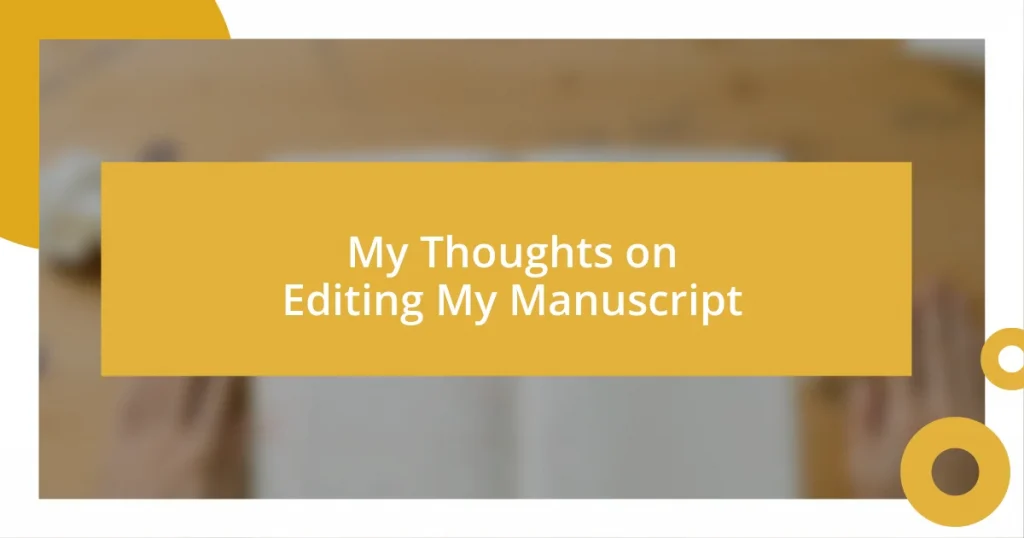Key takeaways:
- Understanding personal motivation stems from a desire to connect with others and can be fueled by achieving small, personal writing goals.
- Creating a consistent writing routine and utilizing changes in environment can enhance creativity and break through writer’s block.
- Engaging with accountability partners and celebrating small writing achievements fosters motivation and builds a supportive writing community.
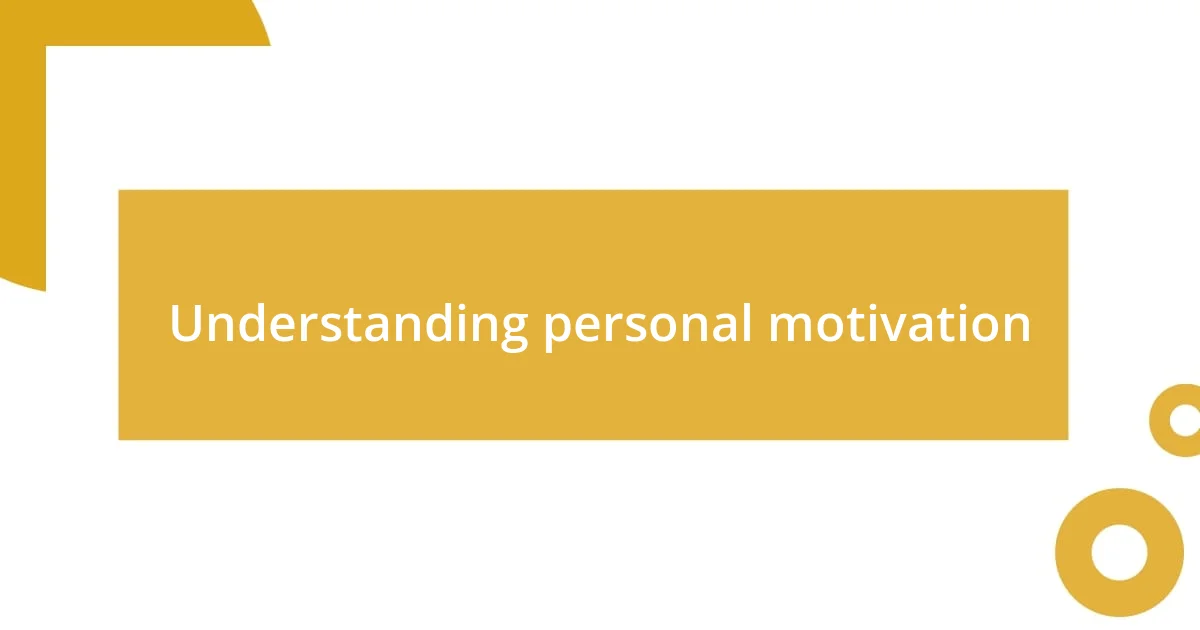
Understanding personal motivation
Understanding what drives me to write is a journey of self-discovery. For instance, there have been days when I sat in front of a blank page, feeling a mix of frustration and excitement. It made me wonder: what truly sparks that fire within me?
Reflecting on past experiences, I realized my motivation often stems from a desire to connect with others. When I receive feedback from readers expressing how my words impacted them, it brings a surge of purpose. Have you ever felt that connection when someone shares how your story mirrored their own life? It’s that powerful bond that keeps me going.
I’ve also learned that setting personal goals can keep my motivation alive. For instance, when I decided to write for thirty minutes every day, it felt like a commitment to myself. How does it feel to set a goal and achieve it day by day? Each small accomplishment, like completing a paragraph or refining a sentence, fuels my passion further, showing me that motivation can be nurtured, cultivated, and celebrated regularly.
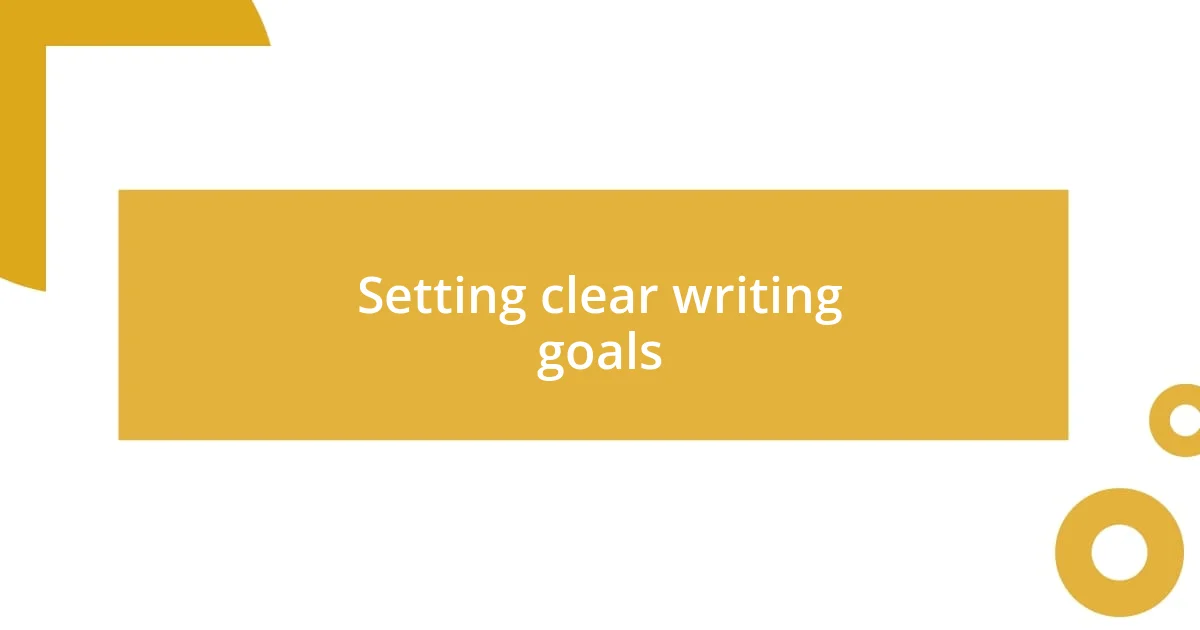
Setting clear writing goals
Setting clear writing goals is more than just a method to organize my thoughts; it’s a way to ignite my creativity every single day. I can still recall the thrill I felt when I first mapped out my writing objectives on a sticky note and placed it on my desk. Each time I glanced at it, I was reminded of my commitment. Breaking down larger projects into attainable tasks makes the journey feel less daunting and incredibly satisfying.
Here are some strategies I’ve found effective for setting clear writing goals:
– Be Specific: Instead of saying “I want to write more,” I focus on “I will write 500 words daily.”
– Set Deadlines: I attach dates to my goals, which creates a sense of urgency that pushes me to write.
– Celebrate Progress: Acknowledge each completed goal, no matter how small. I often reward myself with a favorite snack or a short walk.
– Reflect and Adjust: I regularly review my goals and adjust them based on my progress and any new inspiration I may have.
– Visualize Success: I imagine the finished piece and how it will feel to share it with others, which fills me with excitement.
These insights might seem simple, but they transform the writing process into a structured adventure rather than a chaotic endeavor.
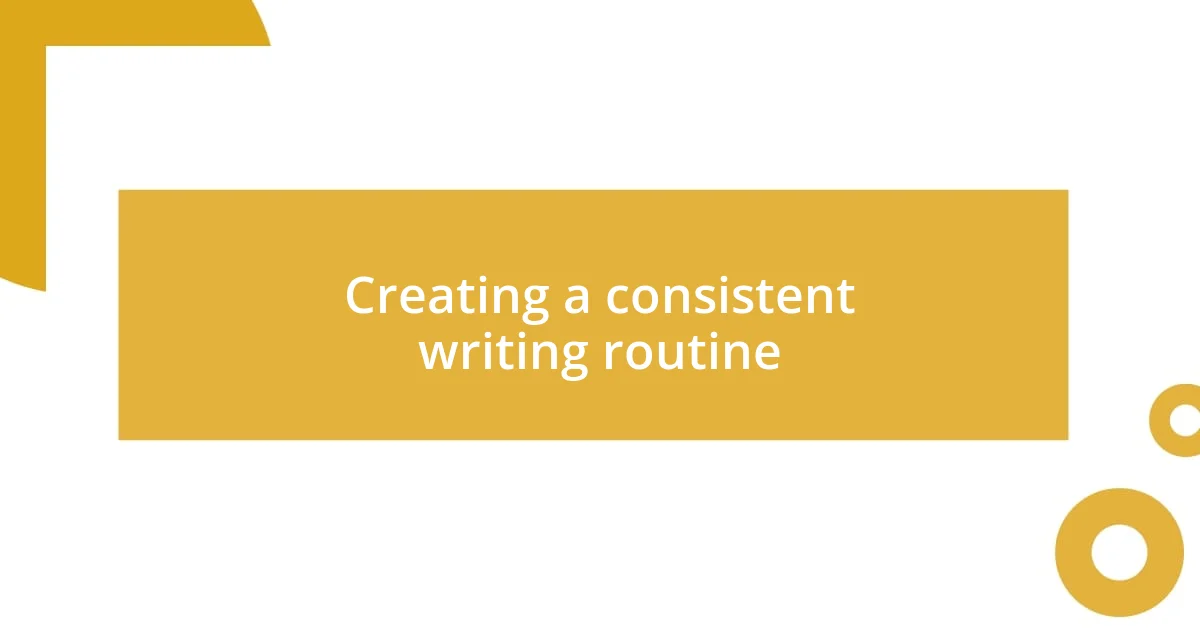
Creating a consistent writing routine
Creating a consistent writing routine has been a game-changer for me. I’ve discovered that having specific times blocked out for writing helps to keep my momentum going. I remember the first time I committed to writing every morning at 7 a.m.; it was like consistently watering a plant. The creativity that bloomed from that routine was nourishing.
Some days, I may not feel like writing, but I’ve learned to push through those moments. On days like this, I simply remind myself to write for just ten minutes. Surprisingly, many times, those short bursts turn into longer sessions. It’s fascinating how setting aside even a little time can lead to unexpected flow and inspiration. Have you ever experienced that too?
One particularly impactful practice I’ve embraced is journaling about my day before diving into my main writing. It clears my mind and allows me to focus on the task ahead with fresh eyes. By maintaining this habit, I’ve built a steady rhythm that brings me clarity and a sense of accomplishment, fueling my desire to write even more.
| Before Routine | After Routine |
|---|---|
| Inconsistent writing times | Set writing times (e.g., 7 a.m. daily) |
| Long breaks without writing | Short, consistent daily sessions |
| Overwhelmed by projects | Structured approach with daily goals |
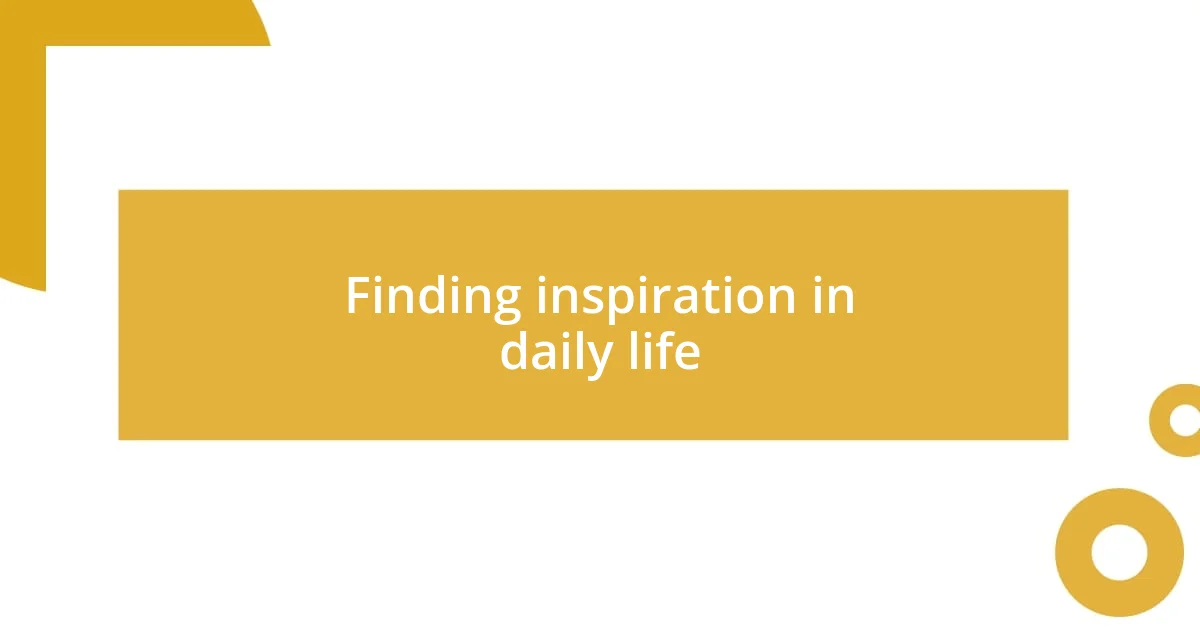
Finding inspiration in daily life
Finding inspiration in daily life often comes from the smallest moments that can spark my creativity. I love taking walks around my neighborhood; it’s amazing how a simple change of scenery can shift my mindset. One afternoon, I noticed an elderly man tending to his garden. The way he carefully nurtured each flower reminded me of how important it is for writers to cultivate their ideas, as each one can bloom into something beautiful. Have you ever had a spontaneous moment like that that suddenly made you think of a story or a character?
I also find inspiration in conversations with friends or even strangers. Just the other day, I overheard two people chatting about their travels in a coffee shop. Their excitement and passion were infectious, leading me to reflect on my own travel experiences. Exploring the interactions and stories of others can be a goldmine for ideas; it has helped me craft relatable characters and engaging plotlines. So, who have you encountered recently that left a mark on your imagination?
Sometimes, inspiration comes from unexpected sources like the pages of a book or an article. Diving into reading not only fills my mind with new information but also sparks reflections that propel my writing forward. I remember reading a thought-provoking piece on human connections that made me stop and think about the characters I was developing. How do we communicate our innermost thoughts? It was a question that reshaped my narrative and gave it depth. Embracing these moments fosters a creative environment that thrives on curiosity and wonder.
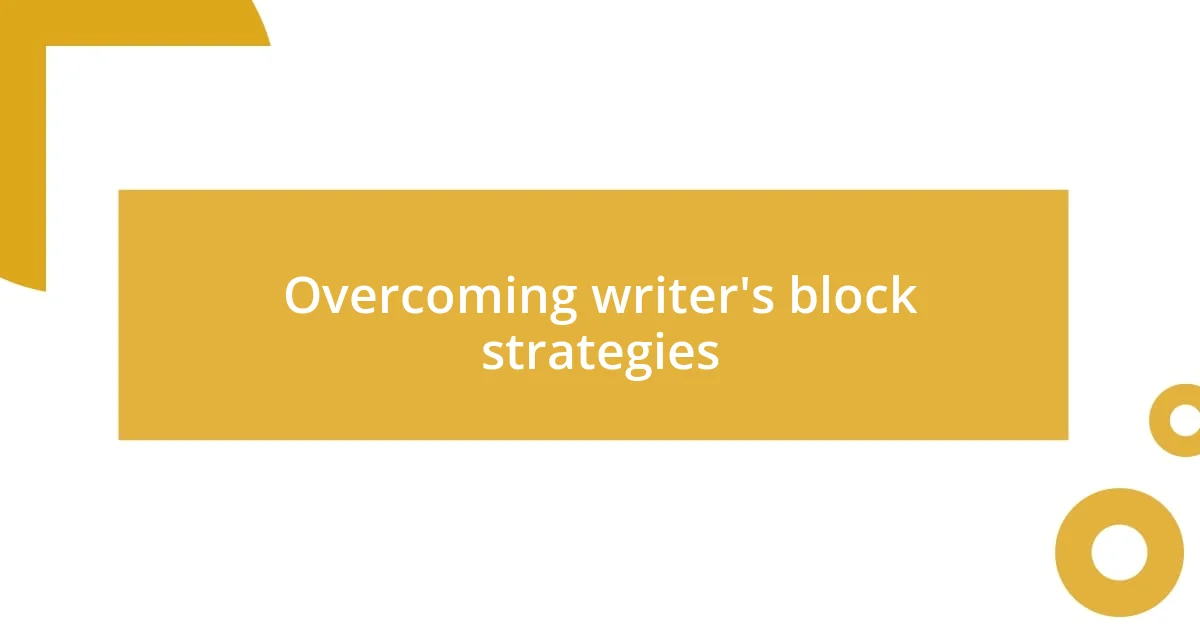
Overcoming writer’s block strategies
When I encounter writer’s block, one strategy that consistently helps me is to change my environment. I remember a particular day when I was stuck at my desk, feeling like my creativity had hit a brick wall. I decided to grab my notebook and head to a nearby park. The fresh air and sounds of nature recharged my mind and suddenly, ideas flowed like water. Have you ever thought about how a simple shift in your surroundings might just spark a breakthrough?
Another approach I often use is setting very small, achievable goals. Instead of aiming for a full chapter, I’ll focus on writing just one paragraph or even a single sentence. This makes the task feel less daunting, and I find that once I start writing, the words seem to cascade naturally. During one such session, I started with a single sentence about a character’s thoughts, and before I knew it, I had outlined a whole scene. Isn’t it fascinating how reducing pressure can lead to a flood of inspiration?
Lastly, I’ve found that revisiting old writing can reignite my creative flame. Whenever I’m feeling uninspired, I like to flip through my previous drafts and random notes. One day, I stumbled upon a half-finished story that I had abandoned months earlier. Reading it reminded me of my initial excitement and sparked new ideas for how to revive it. Have you ever unearthed forgotten gems in your own work? It’s incredible what a little reflection can do to unlock new pathways in our writing journey.

Utilizing writing accountability partners
Utilizing writing accountability partners has been a game changer for me. Having someone who understands the struggles and triumphs of the writing process helps keep me focused. I vividly recall a time when my writing partner reached out to check on my progress for an upcoming deadline. Just knowing someone was invested in my success reignited my determination to produce quality work. Have you ever felt that nudge from a friend that pushed you back on track?
Moreover, our regular check-in sessions have become a ritual I deeply value. During these conversations, we share our goals and challenges, which creates a safe space to brainstorm ideas and solve creative dilemmas. Just last week, I was stuck on a plot twist, and my partner’s fresh perspective helped me see an angle I hadn’t considered. Isn’t it remarkable how a different viewpoint can open doors to new possibilities in your writing?
I’ve also learned that accountability works both ways. Not only does my partner motivate me, but I feel a sense of responsibility to uplift them as well. It’s this mutual support that transforms our sessions into collaborative brainstorming rather than just goal-setting. When I see my partner’s excitement about their project, it inspires me to push through my own blocks. Have you ever experienced that contagious enthusiasm from someone else? It’s like a spark that can light up your creative engine!
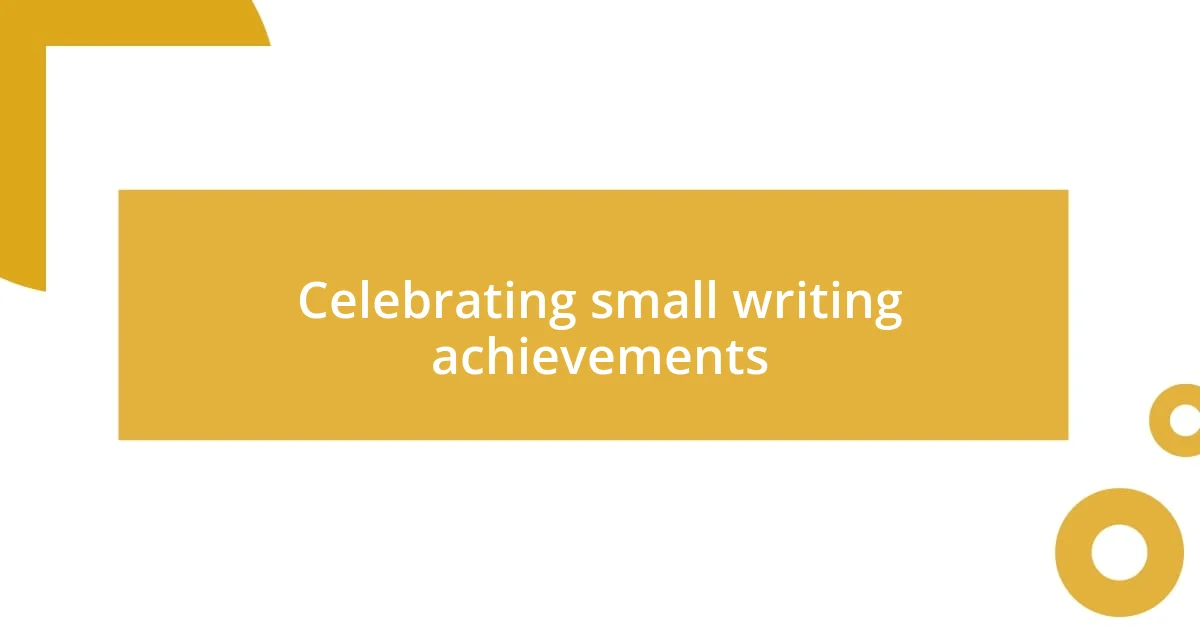
Celebrating small writing achievements
Celebrating small writing achievements is something I’ve come to cherish in my writing journey. I remember the thrill of simply finishing a draft, even if it was just a few pages long. That little rush of accomplishment felt like I had conquered a mountain! Have you felt that way when completing a small milestone? It’s those tiny victories that give us the energy to keep pushing forward.
Sometimes, I reward myself after hitting small word count goals, like treating myself to my favorite coffee or an episode of a show I love. I find that these small celebrations create positive reinforcement. It’s a little ritual that makes the process enjoyable, rather than just a task on my to-do list. Have you ever thought about how a small treat can elevate your mood and motivate your next session? It’s amazing how rewarding ourselves can pave the way for better writing habits.
One of the most memorable moments was when I completed a short story that I had poured my heart into. It wasn’t perfect, but sharing it with friends who offered encouraging feedback made me feel like I had accomplished something meaningful. Celebrating that moment with a small gathering of writer friends really elevated my spirits. Have you ever had a similar experience where sharing feels like an achievement in itself? Recognizing these steps doesn’t just build confidence; it creates a supportive community around our writing aspirations.















